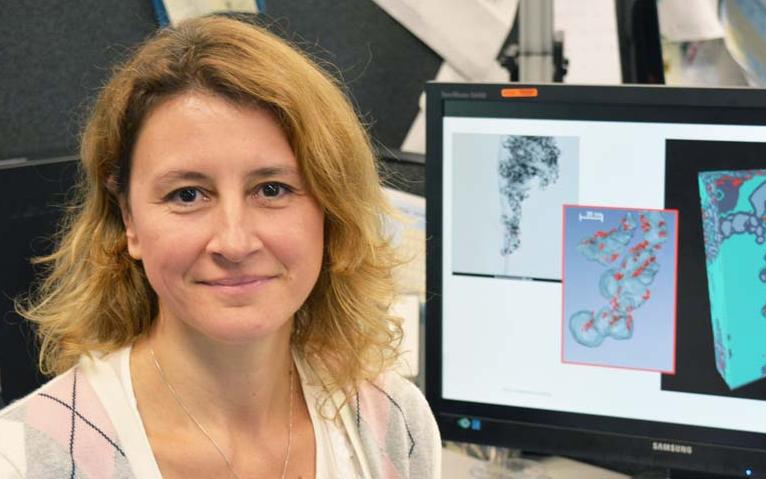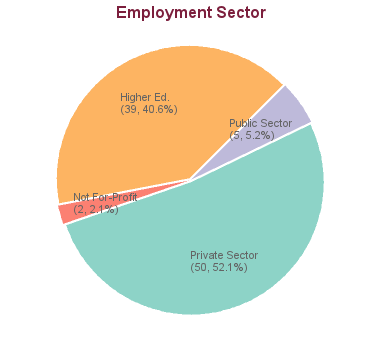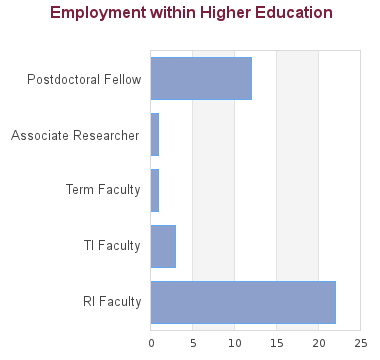
Jasna Jankovic
Job Title
Assistant Professor
Employer
University of Connecticut

Review details about the recently announced changes to study and work permits that apply to master’s and doctoral degree students. Read more
Chemical and Chemical & Biological engineers create and develop processes to change raw materials into the products that society depends on; food, chemicals, fuels, energy, metals, pharmaceuticals, paper, plastics, and personal care products. Chemical and process engineers help to manage natural resources, protect the environment, control health and safety procedures, and recycle materials, while developing and managing the processes which make the products we use.
The Department of Chemical and Biological Engineering was established in 1999 at UBC, and reflects the growing need for engineers in the fields of biotechnology, biomedical and bio-resource engineering. At present there are 24 full-time faculty in the Department of Chemical and Biological Engineering, together with a support staff of 17.
We have established a world-class reputation in several areas of chemical engineering science including fluid-solids contacting, pulp and paper engineering, heat exchanger fouling and, more recently, biotechnology.
The Department is actively engaged in applied research, CHBE faculty-led research provides innovative and sustainable solutions to pressing local and global challenges to industry and society.
Solutions to the above challenges are inextricably linked to our understanding of complex chemical and biological systems.
The Faculty of Graduate and Postdoctoral Studies establishes the minimum admission requirements common to all applicants, usually a minimum overall average in the B+ range (76% at UBC). The graduate program that you are applying to may have additional requirements. Please review the specific requirements for applicants with credentials from institutions in:
Each program may set higher academic minimum requirements. Please review the program website carefully to understand the program requirements. Meeting the minimum requirements does not guarantee admission as it is a competitive process.
Applicants from a university outside Canada in which English is not the primary language of instruction must provide results of an English language proficiency examination as part of their application. Tests must have been taken within the last 24 months at the time of submission of your application.
Minimum requirements for the two most common English language proficiency tests to apply to this program are listed below:
Overall score requirement: 90
Reading
22
Writing
21
Speaking
21
Listening
22
Overall score requirement: 6.5
Reading
6.0
Writing
6.0
Speaking
6.0
Listening
6.0
Some programs require additional test scores such as the Graduate Record Examination (GRE) or the Graduate Management Test (GMAT). The requirements for this program are:
The GRE is not required.
Deadline to submit online application. No changes can be made to the application after submission.
Transcript DeadlineDeadline to upload scans of official transcripts through the applicant portal in support of a submitted application. Information for accessing the applicant portal will be provided after submitting an online application for admission.
Referee DeadlineDeadline for the referees identified in the application for admission to submit references. See Letters of Reference for more information.
All applicants have to submit transcripts from all past post-secondary study. Document submission requirements depend on whether your institution of study is within Canada or outside of Canada.
A minimum of two references are required for application to graduate programs at UBC. Each graduate program determines the type of reference (e.g. academic, professional) and number of references they require which can range from 2 to 4. References should be requested from individuals who are prepared to provide a report on your qualifications for the program.
Many programs require a statement of interest, sometimes called a "statement of intent", "description of research interests" or something similar.
Students in research-based programs usually require a faculty member to function as their thesis supervisor. Please follow the instructions provided by each program whether applicants should contact faculty members.
Permanent Residents of Canada must provide a clear photocopy of both sides of the Permanent Resident card.
All applicants must complete an online application form and pay the application fee to be considered for admission to UBC.
| Fees | Canadian Citizen / Permanent Resident / Refugee / Diplomat | International |
|---|---|---|
| Application Fee | $116.25 | $168.25 |
| Tuition * | ||
| Installments per year | 3 | 3 |
| Tuition per installment | $1,875.34 | $3,294.66 |
| Tuition per year (plus annual increase, usually 2%-5%) | $5,626.02 | $9,883.98 |
| Int. Tuition Award (ITA) per year (if eligible) | $3,200.00 (-) | |
| Other Fees and Costs | ||
| Student Fees (yearly) | $1,144.10 (approx.) | |
| Costs of living | Estimate your costs of living with our interactive tool in order to start developing a financial plan for your graduate studies. | |
Applicants to UBC have access to a variety of funding options, including merit-based (i.e. based on your academic performance) and need-based (i.e. based on your financial situation) opportunities.
From September 2024 all full-time students in UBC-Vancouver PhD programs will be provided with a funding package of at least $24,000 for each of the first four years of their PhD. The funding package may consist of any combination of internal or external awards, teaching-related work, research assistantships, and graduate academic assistantships. Please note that many graduate programs provide funding packages that are substantially greater than $24,000 per year. Please check with your prospective graduate program for specific details of the funding provided to its PhD students.
This results in a net balance (any funding provided to the student minus tuition and fees) mean of $32,515 and median of $31,472.
All applicants are encouraged to review the awards listing to identify potential opportunities to fund their graduate education. The database lists merit-based scholarships and awards and allows for filtering by various criteria, such as domestic vs. international or degree level.
Many professors are able to provide Research Assistantships (GRA) from their research grants to support full-time graduate students studying under their supervision. The duties constitute part of the student's graduate degree requirements. A Graduate Research Assistantship is considered a form of fellowship for a period of graduate study and is therefore not covered by a collective agreement. Stipends vary widely, and are dependent on the field of study and the type of research grant from which the assistantship is being funded.
Graduate programs may have Teaching Assistantships available for registered full-time graduate students. Full teaching assistantships involve 12 hours work per week in preparation, lecturing, or laboratory instruction although many graduate programs offer partial TA appointments at less than 12 hours per week. Teaching assistantship rates are set by collective bargaining between the University and the Teaching Assistants' Union.
Academic Assistantships are employment opportunities to perform work that is relevant to the university or to an individual faculty member, but not to support the student’s graduate research and thesis. Wages are considered regular earnings and when paid monthly, include vacation pay.
Canadian and US applicants may qualify for governmental loans to finance their studies. Please review eligibility and types of loans.
All students may be able to access private sector or bank loans.
Many foreign governments provide support to their citizens in pursuing education abroad. International applicants should check the various governmental resources in their home country, such as the Department of Education, for available scholarships.
The possibility to pursue work to supplement income may depend on the demands the program has on students. It should be carefully weighed if work leads to prolonged program durations or whether work placements can be meaningfully embedded into a program.
International students enrolled as full-time students with a valid study permit can work on campus for unlimited hours and work off-campus for no more than 24 hours a week during academic sessions.
A good starting point to explore student jobs is the UBC Work Learn program or a Co-Op placement.
Students with taxable income in Canada may be able to claim federal or provincial tax credits.
Canadian residents with RRSP accounts may be able to use the Lifelong Learning Plan (LLP) which allows students to withdraw amounts from their registered retirement savings plan (RRSPs) to finance full-time training or education for themselves or their partner.
Please review Filing taxes in Canada on the student services website for more information.
Applicants have access to the cost estimator to develop a financial plan that takes into account various income sources and expenses.
106 students graduated between 2005 and 2013: 1 graduate is seeking employment; 1 is in a non-salaried situation; for 8 we have no data (based on research conducted between Feb-May 2016). For the remaining 96 graduates:


These statistics show data for the Doctor of Philosophy in Chemical and Biological Engineering (PhD). Data are separated for each degree program combination. You may view data for other degree options in the respective program profile.
| 2023 | 2022 | 2021 | 2020 | 2019 | |
|---|---|---|---|---|---|
| Applications | 82 | 94 | 99 | 116 | 84 |
| Offers | 18 | 14 | 15 | 30 | 12 |
| New Enrolment | 10 | 12 | 12 | 27 | 10 |
| Total Enrolment | 82 | 82 | 83 | 67 | 70 |
Students in research-based programs usually require a faculty member to function as their thesis supervisor. Please follow the instructions provided by each program whether applicants should contact faculty members.
These videos contain some general advice from faculty across UBC on finding and reaching out to a supervisor. They are not program specific.
This list shows faculty members with full supervisory privileges who are affiliated with this program. It is not a comprehensive list of all potential supervisors as faculty from other programs or faculty members without full supervisory privileges can request approvals to supervise graduate students in this program.
| Year | Citation |
|---|---|
| 2024 | Dr. Asadi developed sustainable solutions utilizing ion exchange and electrochemical processes for effectively treating per- and poly-fluoro alkyl substances, commonly known as "forever chemicals," from water sources. |
| 2024 | Dr. Zimmermann loves water. His primary research at UBC was understanding the science and application of a biological drinking water filter. However, his interests in water took him into the world of sustainable development when he got to visit nine NGOs on five continents to learn about their experiences with safe water for community health. |
| 2024 | Dr. Bi aimed at improving the electrolyzer design, operation, and measurement toward ammonia electrosynthesis. He pinpointed inefficiencies of commercial separators in aqueous setups and designed low-cost electrodes for non-aqueous electrolyzers to benefit sustainable ammonia production. |
| 2024 | Dr. Cao focused on using artificial intelligence (AI) to develop interpretable and robust data-driven technologies. His work offers innovative frameworks for enhancing the monitoring, control, and optimization of industrial processes, leading to improved environmental sustainability and modernizing industrial applications. |
| 2024 | Dr. Villalba investigated the mechanisms by which fibres form jams in pressure screening. He identified jamming as a random, intermittent process and discovered that the jamming intermittency provides insights into onset of permanent blockages, potentially leading to the development of a sensor for screening operations. |
| 2024 | Dr. Wang's research focuses on accurately modeling Lithium-ion battery degradation from a data-driven perspective. He proposed various methods to enhance the generalizability of the model and developed a highly interpretable model. This study significantly advances the safe and reliable usage of Lithium-ion batteries. |
| 2024 | Dr. Goyal developed a fast and accurate method to solve complex flow problems such as dust storms and the transmission of airborne viruses. The method uses the supercomputers efficiently to provide the solution five times quicker than the conventional method, allowing further investigation of complex flow problems in industries. |
| 2024 | Dr. Pei studied bifunctional gas diffusion electrodes for reversible oxygen reaction catalysis. The findings provide valuable insights into designing durable and highly active transition-metal-based reversible oxygen electrodes for energy conversion and storage systems, contributing to a green future. |
| 2024 | Dr. Mirzaei delved into finding an environmentally friendly water treatment train for highly toxic chemicals called PFAS. Her thorough systematic experimental and theoretical work orchestrated the potential combination of UV based degradation and removal techniques and offered new mechanistic understanding and guidelines in the given application. |
| 2023 | Dr. Masjoudi demonstrated the potential of vacuum-UV advanced oxidation processes as a viable treatment for elimination of micropollutants in potable water reuse. Her research enhances the quality of recycled water, making the reuse strategy more feasible for water-scarce communities. |
Chemical and Biological Engineering provides innovative and sustainable solutions to pressing local and global challenges to industry and society, with faculty being engaged in the following broad areas:
Departments/Programs may update graduate degree program details through the Faculty & Staff portal. To update contact details for application inquiries, please use this form.

The metropolitan area is known for its diversity and UBC is one of the most international universities in Canada. This multicultural community means we have a wide range of restaurants, grocery stores, and events to provide a sense of belonging.